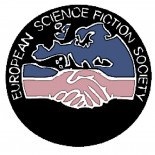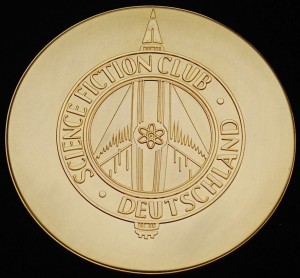RIP : Wolfgang Jeschke, A Major European SF Writer (November 19, 1936 - June 10, 2015)

„For Wolfgang Jeschke, a stylistically influential narrator, Science Fiction was the promise of intellectual and aesthetic universality.” - Dietmar Dath, Frankfurter Allgemeine Zeitung
Wolfgang Jeschke (Herr Zukunft/Mr.Future) was one of the best European SF writers, a humanist and the Grand Master of the German Science Fiction, one of the most popular European and German SF writers.
Wolfgang Jeschke died Wednesday, the 10th of June 2015 at the age of 78 years in Munich, Germany. This was announced by the Heyne-Verlag (Publishing Press) on Thursday, the 11th of June 2015. RIP !
“The Heyne Verlag bows to Wolfgang Jeschke: in deep sorrow and compassion. He was the Grand Master of the German science fiction. In Germany he loved Science Fiction like no other.”

“Wolfgang Jeschke’s sphere of activity was certainly not limited to the German-speaking countries.
Jeschkes’ “The Cusanus Game“, a novel on the medieval mathematician and theologian Nicholas of Cusa, was praised by Gary K.Wolfe, one of the most knowledgeable critics of the genre, as “the work as a successful attempt, revealing the complexity and diversity of the experience of time with unusual stylistic techniques”.
Gary K.Wolfe compared “The Cusanus Game” with Umberto Eco’s “Foucault’s Pendulum” and similar epic that “provides genre mechanisms to serve dense philosophical legends”, and this applies to other Jeschkes’ works , as the melancholy thriller about the relationship between energy and political history “The Last Day of Creation” from 1981, or the bold splintered into unmanageable multifaceted picture of the human condition, the warning fable, “Midas” from 1989.” - Dietmar Dath
Wolfgang Jeschke was also an SF editor, publishing at Lichtenberg and Heyne Publishing Houses (Lichtenberg Verlag ; Heyne-Verlag): the series Science Fiction für Kenner (Science Fiction for Connoisseurs) and Heyne Science Fiction and Fantasy, one of the largest and most diverse in Europe.
He has also edited more than 100 anthologies, from 1970 on, many containing material translated from the English. Since 1986 for Heyne Verlag, he has edited Das Science-Fiction Jahr (The Science Fiction Yearbook), an extremely large anthology of fiction and nonfiction; since 2003 his co-editor has been Sascha Mamczak; the Heyne Science Fiction Jahresband (Heyne Annual Science Fiction Anthology, 21 volumes published 1980-2000) ; Bibliothek der Science Fiction Literatur (“Library of Science Fiction Literature”, 101 volumes published 1981-2001). Wolfgang Jeschke brought high-quality foreign science fiction to Germany and promoted equally German SF writers, not least in numerous anthologies and volumes which he edited.
He was one of the most awarded german SF writers, receiving 19 times the prestigious Kurd-Lasswitz Prize and also the Deutsche Science Fiction Prize. In 1987, he won the Harrison Award for International Achievements in Science Fiction, was a Guest of Honor at ConFiction, the 1990 Worldcon in the Hague, and was inducted into the European Science Fiction Society’s Hall of Fame in 2014. He lived in Munich.
Wolfgang Jeschke was born in 1936 in Děčín/Tetschen, Czechoslovakia. After 1945 he grew up in Asperg near Ludwigsburg, West Germany. He trained as a toolmaker and worked in mechanical engineering. In 1959, he went back to complete his studies and studied German, English literature, and philosophy at Ludwig Maximilian University of Munich. He then completed a publishing internship at Verlag C. H. Beck. In 1969, he was hired as editorial assistant for Kindlers Literaturlexikon, and then later editor.
In 1970 nonfiction author Herbert W. Franke offered Kindlers Press a science fiction novel; the publisher remembered Jeschke’s interest in science fiction and asked him for his opinion. The result was the series “Science Fiction für Kenner” (Science Fiction for Connoisseurs) under the imprint Lichtenberg Verlag, in which appeared not only Franke’s novel Zone Null but also Jeschke’s own short-story collection, Der Zeiter (The Bridegroom).
This imprint published a number of important authors unabbreviated in German for the first time, including Robert Silverberg, Thomas M. Disch, and Brian W. Aldiss.
At the end of 1972, Jeschke took the position of science fiction consultant and editor at Heyne Verlag – originally together with Franke – at first as a freelancer. The success of Heyne Science Fiction and Fantasy led to a growing number of titles, so that in 1978, Jeschke left Kindler and became full-time science fiction specialist for Heyne.
After Herbert Franke’s departure in 1979, Jeschke was the sole science fiction editor at Heyne, where he remained until his retirement in 2002. He continued to live in Munich, where he continued to work on the Science Fiction Jahrbuch (Science Fiction Yearbook), together with Sascha Mamczak.
Jeschke had been interested in science fiction since the 1950s, and was one of the first members of the SFCD (Science Fiction Club Deutschland), founded in 1955. His first short stories appeared in fanzines and semi-professional publications, and together with Peter Noga, he published his own fanzine, Ad Astra. He wrote little during his years as consultant and editor, and his body of work remains relatively small. His science fiction is known for its themes of time travel and paradox.

His first novel, Der letzte Tag der Schöpfung (The Last Day of Creation), was widely translated. Jeschke also wrote radio plays.
He began to publish SF with Die Anderen (The Others) in 1959, but first became strongly involved with the genre in 1969 when, while working as co-editor of Kinders Literaturlexikon he edited as a freelancer the Science Fiction fur Kenner series for Lichtenberg Verlag.

In Midas oder Die Auferstehung des Fleisches (1987; trans Sally Schiller as Midas, 1990), set on a Near-Future Earth which has suffered severe Ecological damage, a primitive Matter Duplication technique has been discovered, but the copies of humans thus produced are crude and cannot live longer than a few months.
Also set in a Near Future Earth wracked by Climate Change, Das Cusanus-Spiel (2005; trans Ross Benjamin as The Cusanus Game, 2013) postulates in great detail a form of Time Travel which might enable trained operatives to return to the fifteenth century in order to bring back genetically undamaged flora; more intrusive uses of the procedure, including an attempt to persuade Nikolaus Cusanus (1401-1464) to begin to create a different future through the establishment of a scientific academy, prove helpless against the self-correcting braid through time of the many Alternate Worlds that make up the Multiverse.
Jeschke’s writing is humanist in orientation and strongly (on occasion overbearingly) ironic in tone, subtle and original.

Novels
1981 Der letzte Tag der Schöpfung (The Last Day of Creation)
1993 Midas oder Die Auferstehung des Fleisches (Midas Or The Rising of the Flesh; UK edition 1990: Midas)
1997 Meamones Auge (Meamone’s Eye)

1997 Osiris Land (Land of Osiris; US edition : The Land of Osiris in „Isaac Asimov’s Science Fiction Magazine“, March 1985)

2005 Das Cusanus-Spiel oder Ein abendländliches Kaleidoskop (The Cusanus Game, Deutscher Science Fiction Preis)

2013 Dschiheads (Jiheads)
Short Fiction
1959 Die Anderen (The Others)
1970 Der Zeiter (The Bridegroom, rev. Edition 1978)

1993 Schlechte Nachrichten aus dem Vatikan (Bad News from the Vatican)
Collected Stories

2006 Der Zeiter (The Bridegroom, expanded edition; foreword by Andreas Eschbach)

2008 Partner fürs Leben (including Meamones Auge; foreword by Franz Rottensteiner)

2011 Orte der Erinnerung (Places of Remembrance including Osiris Land; foreword by Herbert W. Franke)
Non-fiction
2003 Marsfieber (Mars Fever, with Rainer Eisfeld)
Anthologies/Magazines
Heyne Science Fiction Jahresband (Heyne Annual Science Fiction Anthology, 21 volumes published 1980-2000)
Heyne Science Fiction Magazin (“Heyne Science Fiction Magazine”, 12 issues published 1981-1985)
Bibliothek der Science Fiction Literatur (“Library of Science Fiction Literature”, 101 volumes published 1981-2001)
Das Science Fiction Jahr (The Science Fiction Yearbook, 26 volumes published since 1985, on-going)
Science Fiction Story Reader (21 issues published 1974-1984, six of them edited by Herbert W. Franke)
Titan (23 issues published 1976-1985)

Wolfgang Jeschke - Summary Bibliography:
http://www.isfdb.org/cgi-bin/ea.cgi?5561

RIP !


